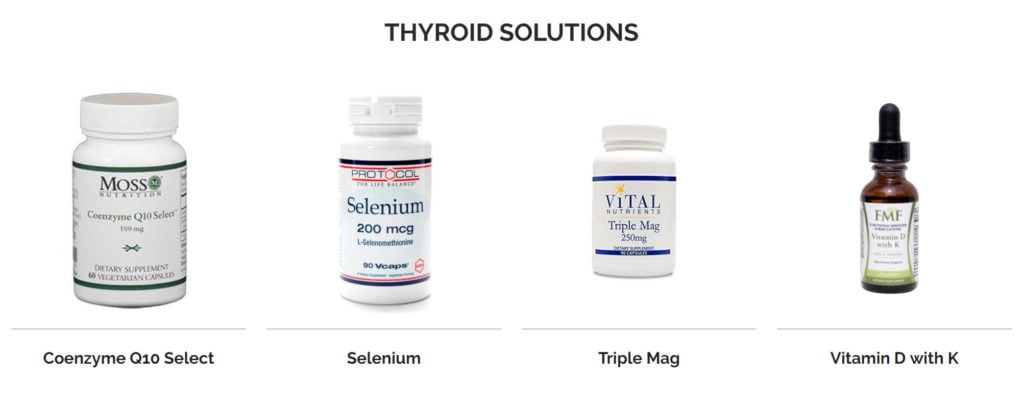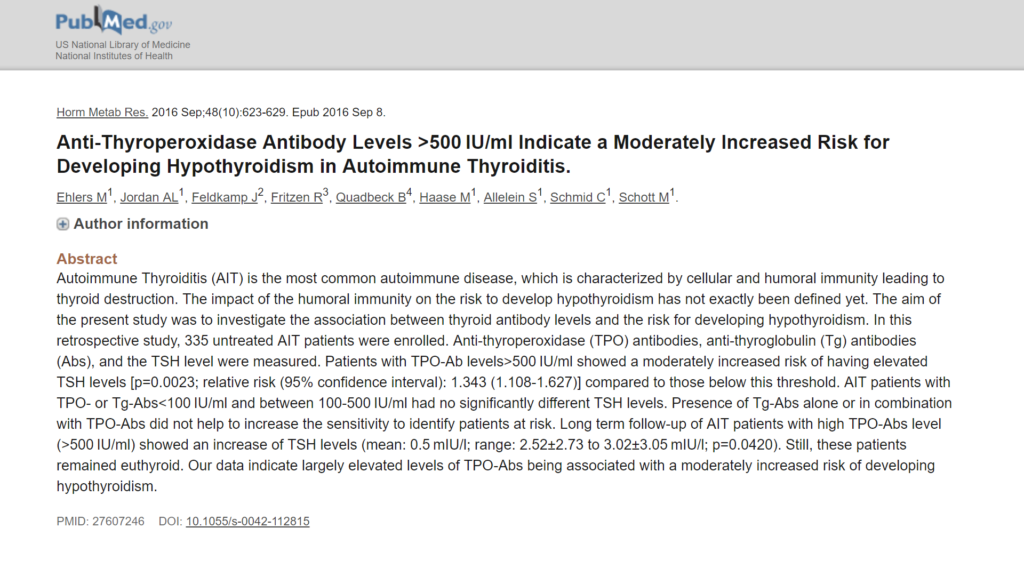Thyroid Autoimmunity – Healthy Levels for Thyroid Antibodies
Thyroid autoimmunity (also known as Hashimoto’s) is the most common cause of hypothyroidism. It is a process where your immune system makes antibodies against your thyroid gland. This then causes damage to the thyroid. Lab tests are available to gauge the severity of this autoimmune process, but doctors and patients are often unsure of what “healthy” values on these tests are. So what is a “healthy” value? Let’s answer this question.
Dr. Michael Ruscio: Hi, this is Dr. Ruscio. Let’s talk about thyroid autoimmunity and what level of thyroid antibodies is considered healthy. Now, in case you were not aware of this already, thyroid autoimmunity is the most common cause of hypothyroidism in most Westernized countries. It typically manifests as a process known as Hashimoto’s. This is certainly something that we want to be cognizant of because the level of thyroid autoimmunity has been shown to correlate with both hypothyroidism and thyroid cancer. So it is important for us to know if one does, or does not, have thyroid autoimmunity present.
There are some well-established treatments that we’ve talked about in prior videos and posts. Diet is one, specifically a gluten-free diet, and in one written study, a lower-carbohydrate diet. Both have shown the ability to be able to quite dramatically dampen thyroid autoimmunity.
Nutritional Supplements
There are also different nutritional supplements that can be used. Most notably, there’s a protocol using selenium and CoQ10. Magnesium has shown benefit and vitamin D has also shown benefit in lowering thyroid autoimmunity in clinical trials. Additionally, there is one noteworthy study in the treatment of H. pylori, a stomach bacteria. This study showed that the successful treatment of H. pylori to be able to lower thyroid antibodies in those with thyroid autoimmunity.

Another case study showed that after the treatment of blastocystis hominis, a gut bug-like protozoa, thyroid autoimmunity was improved. So there’s definitely some treatments that can help with lowering thyroid autoimmunity. Since elevations correlate with negative outcomes like hypothyroidism and thyroid cancer, reason would suggest that lowering thyroid antibodies would be a good idea. This is certainly not a hard argument to make.
The one important thing that often gets left out of this conversation or is overlooked is the question of: ‘When have you succeeded in trying to lower your thyroid antibodies?’ This is a key question. And what I have observed is that oftentimes patients are quite distraught if they can’t get their thyroid antibodies down to what is considered a normal range. Now, normal is usually defined as at or below 30 or 35 for the most clinically-relevant antibody known as TPO or thyroid peroxidase. This can be measured by a lab test that can be done in any doctor’s office or any major lab.
Healthy Levels of Antibodies
Now, I’ve been saying for the past few years that in my observation, 100 to 300 on the TPO antibodies is what I would call a clinical win. Recently (2016), there was a study published that did a fantastic job of trying to quantify when or what. What is a healthy level of antibodies and when can we maybe stop trying to treat the antibodies, so to speak?
What they found was that 500 for TPO antibodies was the cutoff. Meaning, those who were below 500 had an incredibly low risk of future progression to hypothyroidism.

A subgroup of these patients were followed for a little over six years so it was a decent follow-up window. But even the people who were above 500 still only had moderate risk. So it’s important to understand that 500 showed a pretty favorable outcome in these patients. So if you’re a patient or if you’re a doctor working with your patients, and if someone has come from, let’s say, 700, 800, 1,200, 1,400 for their TPO antibodies, and now they’re hovering somewhere around one, two, three, four hundred, then that is starting to look like a clinical win.
Albeit, this is one study. And we don’t want to make too many conclusions based upon one study. But it certainly reinforces what I have seen in the clinic. Way above 500 tends to be a warning flag that you need to act. Below 500 is a sign that you don’t need to keep taking vitamins or doing crazy things with your diet. You can relax a little bit and not be so concerned about the autoimmune condition because it seems that the autoimmune process is in a pretty good place. Don’t aim for perfect underneath 30 to 35, aim for what seems to be a reasonable endpoint or a reasonable level, which is below 500. If you really wanted to be meticulous, maybe below 300, according to my speculative general range.
But the main point of this whole issue is not to be feeling like you chronically have to be pursuing a lower and lower and lower level of thyroid antibodies thinking that it’s going to have a health benefit. Because what it looks like is that if you’re frankly elevated, it’s a problem—above 500, a problem. If you’re below 500, then you’re in pretty good condition. And you don’t have to worry about being at heightened risk for major problems with your thyroid gland. In fact, you don’t even show—there’s a minimal chance that you’ll even progress to hypothyroidism.
Hopefully, this helps people out there who have become cognizant of the fact that thyroid autoimmunity is something that needs to be incorporated into a thyroid healthcare plan but also helps them realize when they cannot have to worry about continuing treatment and trying to drive the antibodies down lower. A win could be considered anything below 500. If you’re significantly above 500, you probably want to take action. If you’ve been hovering around lower than 500 for a while, then you’re probably in pretty good shape.
This is Dr. Ruscio, and I hope this information helps you get healthy and get back to your life. Thanks.
Dr. Michael Ruscio is a DC, natural health provider, researcher, and clinician. He serves as an Adjunct Professor at the University of Bridgeport and has published numerous papers in scientific journals as well as the book Healthy Gut, Healthy You. He also founded the Ruscio Institute of Functional Health, where he helps patients with a wide range of GI conditions and serves as the Head of Research.
Discussion
I care about answering your questions and sharing my knowledge with you. Leave a comment or connect with me on social media asking any health question you may have and I just might incorporate it into our next listener questions podcast episode just for you!